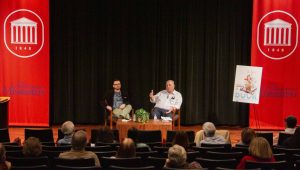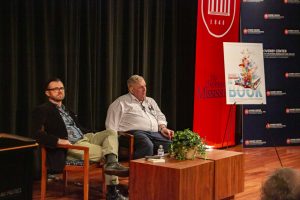A seminal voice in the continually developing world of LGBTQ+ literature, novelist and essayist Edmund White read from his memoir, “The Unpunished Vice: A Life of Reading,” on Wednesday afternoon at the Overby Center. White also fielded questions from his husband and fellow author, Michael Carroll, as well as a number of questions from the audience.

Photo by Katherine Butler
“Unpunished Vice” is the latest publication in White’s expansive body of work that includes memoirs, essays and fiction. Together, these works present a retrospective view of White’s life through the lens of the books he was reading at the time.
The milestones of his life are remembered fondly with the works of poetry, prose and nonfiction that have contributed to his writing, teaching and research, as well as those that have provided entertainment and personal revelations.
The author began his presentation by explaining the title of the memoir and its origin: the French translator and writer, Valery Larbaud, who was the first to call reading an “unpunished vice.” White expanded on the phrase’s personal significance for readers and writers.
“Reading can be a vice in the sense that people can choose it over living, or writers can choose it over writing,” White said.
The preface of “Unpunished Vice,” which White read at the event, referenced major titles that have influenced his professional life and works that shaped his identity as a gay man living in the U.S. in the 1940s and ‘50s.
On the Overby stage, White shared anecdotes ranging from his first time reading to escape his chaotic home life at 6 or 7 years old to the books he’s had to read so he could review them for publications or judge them for literary contests.
When pressed on why he chose to write another memoir — “Unpunished Vice” is his fifth — White said he had already exhausted the angles used to recount his 16 years in Paris or his time as a young gay man living in Manhattan in the 1960s. His decision to write a memoir based on what he has read came after he suffered a heart attack that left him with no desire to read.
White spoke to the integral role reading plays in teaching writers the nuances of their craft. In creative writing courses he teaches, White said he often includes literature that strays from classic American realism.
His hope in including non-Western authors is to expose students to other genres, cultures and writing styles. In his own work as a writer, he credits the importance of the books he read in college for their role in developing his voice.

Prominent LGBTQ author Edmund White read from his most recent memoir at the Overby Center yesterday. Photo by Katherine Butler
“In a way, writers are the luckiest of so-called artists because everybody can read and everybody has written a letter,” White said. “So, we all feel that it’s sort of within our grasp.”
As the hour drew to a close, White continued to field questions from audience members. Among these questions, White was asked if he ever rereads books.
White said he does reread some of his favorite books once a year — including Leo Tolstoy’s “Anna Karenina,” which he claimed is as close as possible to the perfect novel.






